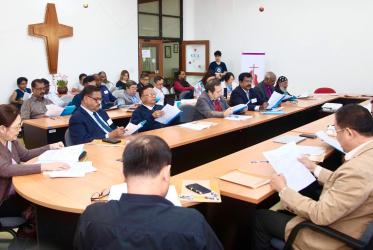A consultation on the theme “En-Gendering Justice: Christians in Conversation with Buddhists on Religion, Gender, Sexuality and Power” explored the relationship between religion and gender from an interreligious perspective.
A close collaboration of the World Council of Churches (WCC) and the International Network of Engaged Buddhists (INEB), the consultation met in Bangkok, Thailand, 26-30 July and examined the role of religion in overcoming discrimination based on gender and sexuality and fostering a just and inclusive world.
The consultation brought together Christian and Buddhist theologians, academics and activists to reflect on the relationship between religion, gender, sexuality and power and assess the role that religion plays in gender socialization from the perspective of Christianity and Buddhism.
The consultation also dealt with pressing issues, including religion and social justice, the political empowerment of women, sex trafficking, ordination of women and transgendered people, religious attitudes toward the body, gender and health, and religious discrimination against LGBTI communities and PLWHA (People Living with HIV and AIDS).
Learning and reflection of the participants were deepened by exposure visits to the Wat Songdhamma Kalyani monastery, the first Buddhist temple in Thailand to have bhikkuni (Buddhist nuns with higher ordination) and the Well-Urban Training Centre, a Christian ministry that serves to assist people affected by or at the risk of entering the sex industry.
“Such experiences [of sex trafficking] call Christians among us to ask, where is the omnipresent God in this? and the Buddhists among us to recognize that structural violence is caused by greed and craving,” said participants in a joint statement.
The consultation modeled a new way of programmatic collaboration between two transversal priorities of the WCC, namely, Interreligious Dialogue and Cooperation (IRDC) and the Just Communities of Women and Men (JCWM),
Dr Fulata Mbano Moyo, WCC’s programme executive for Just Community of Women and Men, and Dr Peniel Jesudason Rufus Rajkumar WCC’s programme executive for Interreligious Dialogue, joint organizers of the conference, in their reflections on the conference said, “The honesty and hospitality that were brought to the table on the uneasy theme of religion, gender, sexuality and power provide reason for the hope that difficult questions need not be glossed over in interfaith conversations.”
“That we ended up probably with more questions and answers is a strong sign that this is just the beginning of an important conversation,” they continued. “As we tread the pilgrimage of justice and peace for a world free from suffering and a life which can be lived in all its fullness, may these first steps together as co-pilgrims be an encouraging and hopeful start.”
Participants in the joint statement affirmed: “Even as we continue to engage with our Buddhist and Christian wisdoms and take responsibility for individual and collective change, we also continue to be challenged by the African song and concept of senzenina: What have we done, and what can we do better?”
Final statement of the consultation
More about the WCC work on Just Community of Women and Men
More about WCC’s work on Interreligious Dialogue and Cooperation
Explore the website of the International Network of Engaged Buddhists



